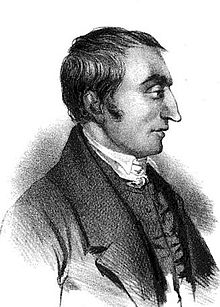Henri Saint-Simon
| Henri de Saint-Simon | |
|---|---|
 |
|
| Born |
17 October 1760 Paris, France |
| Died | 19 May 1825 (aged 64) Paris, France |
| Era | 19th-century philosophy |
| Region | Western philosophy |
| School |
Utopian socialism Saint-Simonianism |
|
Main interests
|
Political philosophy |
|
Notable ideas
|
The industrial class/idling class distinction |
Claude Henri de Rouvroy, comte de Saint-Simon, often referred to as Henri de Saint-Simon (French: [sɛ̃ simɔ̃]; 17 October 1760 – 19 May 1825), was a French political and economic theorist and businessperson whose thought played a substantial role in influencing politics, economics, sociology, and the philosophy of science.
He created a political and economic ideology known as industrialism that claimed that the needs of an industrial class, which he also referred to as the working class, needed to be recognized and fulfilled to have an effective society and an efficient economy. Unlike later conceptions by others of a working class being manual labourers alone, Saint-Simon's conception of this class included all people engaged in productive work that contributed to society, that included businesspeople, managers, scientists, bankers, along with manual labourers amongst others. He said the primary threat to the needs of the industrial class was another class he referred to as the idling class, that included able people who preferred to be parasitic and benefit from the work of others while seeking to avoid doing work. Saint-Simon stressed the need for recognition of the merit of the individual and the need for hierarchy of merit in society and in the economy, such as society having hierarchical merit-based organizations of managers and scientists to be the decision-makers in government. He strongly criticized any expansion of government intervention into the economy beyond ensuring no hindrances to productive work and reducing idleness in society, regarding intervention beyond these as too intrusive.
This ideology soon inspired and influenced utopian socialism,liberal political theorist John Stuart Mill,anarchism through its founder Pierre-Joseph Proudhon who was inspired by Saint-Simon's thought and Marxism with Karl Marx and Friedrich Engels identifying Saint-Simon as an inspiration to their ideas and identifying him among the utopian socialists. However historian Alan Ryan regards certain followers of Saint-Simon, rather than Saint-Simon himself, as being responsible for the rise of utopian socialism that based itself upon Saint-Simon's ideas. He also regards strong differences as existing between Saint-Simon's conceptions and Marxism's as Saint-Simon did not promote class conflict as a solution to societal problems nor did he adhere to the narrower definition of the working class as manual labourers as defined by Marxists. Saint-Simon unlike Marx did not regard the prevalent form of ownership as being paramount issue in the economy but rather the form of management. Furthermore, Saint-Simon held no opposition to capitalists as a whole unlike Marx and he regarded them as an important component of the industrial class. Later Saint-Simon's views influenced sociologist and economist Thorstein Veblen, including Veblen's creation of institutional economics that has included prominent economists as adherents. Historian Alan Ryan states that by the 1950s it was clear that Saint-Simon had invented the modern understanding of industrial society and its organization.
...
Wikipedia
